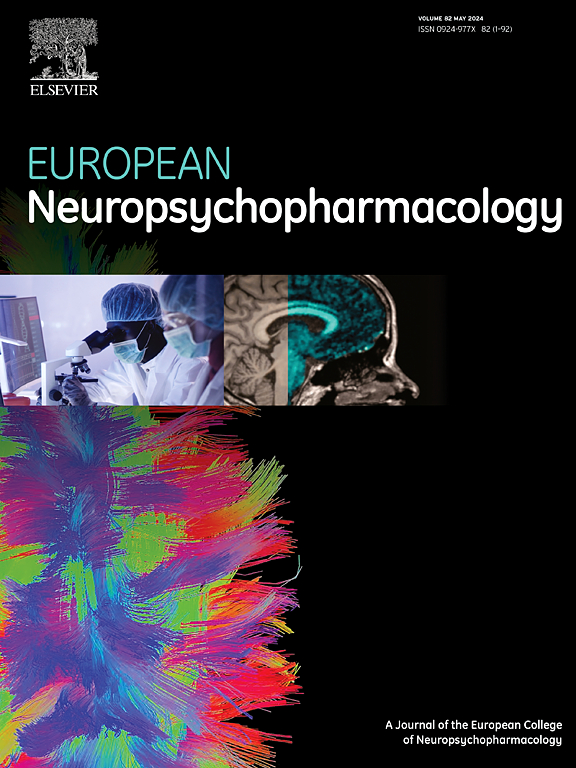Risk of mortality and complications in people with depressive disorder and diabetes mellitus: A 20-year population-based propensity score-matched cohort study
IF 6.1
2区 医学
Q1 CLINICAL NEUROLOGY
引用次数: 0
Abstract
People with depression have increased premature mortality and elevated prevalence of diabetes-mellitus compared to general population. However, risk of mortality and diabetes-related complications among patients with depression and co-occurring diabetes is under-studied. This population-based propensity score-matched (1:10) cohort study identified 12,175 patients with pre-existing depression and incident-diabetes (depression-diabetes group) and 117,958 patients with incident-diabetes only (diabetes-only group) between 2002 and 2021 in Hong-Kong, using territory-wide medical-record database of public-healthcare services, to investigate whether depression increased the risk of overall mortality, complications and post-complication mortality in people with diabetes. Associations of depression with all-cause mortality, complication and post-complication all-cause mortality rates were examined by Cox proportional-hazards model. Complications were assessed by Diabetes-Complications-Severity-Index (DCSI). Associations of complications, in terms of DCSI scores (complication burden), specific types and two-way combinations of complications (complication patterns) with all-cause mortality rate in depression were also examined. Our results showed that depression-diabetes group exhibited increased all-cause mortality risk (adjusted hazards-ratio: 1.06 [95 %CI: 1.02–1.10]) relative to diabetes-only group, particularly among men and older age group, with significantly higher rate of experiencing neuropathy (1.44 [1.27–1.62]) and metabolic complications (1.30 [1.09–1.56]) and lower likelihood of peripheral-vascular complications, retinopathy and nephropathy, albeit comparable macrovascular and microvascular complication rates. The mortality-rate-ratio for patients with depression and diabetes was significantly higher than patients with diabetes-only at a low level of complication burden. In conclusion, depression patients with co-occurring diabetes are at increased risk of excess mortality. Further research is warranted to improve diabetes-related outcomes and reduce mortality gap in this vulnerable population.
抑郁症和糖尿病患者的死亡率和并发症风险:一项20年基于人群的倾向评分匹配队列研究
与一般人群相比,抑郁症患者的过早死亡率和糖尿病患病率增加。然而,抑郁症合并糖尿病患者的死亡风险和糖尿病相关并发症的研究尚不充分。这项基于人群的倾向评分匹配(1:10)队列研究,利用全港公共医疗服务的医疗记录数据库,在2002年至2021年期间,在香港确定了12,175例既往患有抑郁症和偶发糖尿病的患者(抑郁症-糖尿病组)和117,958例仅患有偶发糖尿病的患者(糖尿病组),以调查抑郁症是否增加了总体死亡率的风险。糖尿病患者的并发症和并发症后死亡率。采用Cox比例风险模型检验抑郁症与全因死亡率、并发症及并发症后全因死亡率的关系。采用糖尿病-并发症-严重程度指数(DCSI)评估并发症。根据DCSI评分(并发症负担)、并发症的特定类型和双向组合(并发症模式)与抑郁症全因死亡率的关系也进行了研究。我们的研究结果显示,抑郁症-糖尿病组表现出更高的全因死亡风险(校正危险比:1.06)。1.02-1.10])相对于糖尿病组,尤其是男性和老年组,出现神经病变(1.44[1.27-1.62])和代谢并发症(1.30[1.09-1.56])的几率明显更高,外周血管并发症、视网膜病变和肾病的可能性更低,尽管大血管和微血管并发症的发生率相当。在并发症负担较低的情况下,抑郁症合并糖尿病患者的死亡率明显高于糖尿病患者。总之,合并糖尿病的抑郁症患者有更高的死亡率。需要进一步的研究来改善糖尿病相关的结果,减少这一弱势人群的死亡率差距。
本文章由计算机程序翻译,如有差异,请以英文原文为准。
求助全文
约1分钟内获得全文
求助全文
来源期刊

European Neuropsychopharmacology
医学-精神病学
CiteScore
10.30
自引率
5.40%
发文量
730
审稿时长
41 days
期刊介绍:
European Neuropsychopharmacology is the official publication of the European College of Neuropsychopharmacology (ECNP). In accordance with the mission of the College, the journal focuses on clinical and basic science contributions that advance our understanding of brain function and human behaviour and enable translation into improved treatments and enhanced public health impact in psychiatry. Recent years have been characterized by exciting advances in basic knowledge and available experimental techniques in neuroscience and genomics. However, clinical translation of these findings has not been as rapid. The journal aims to narrow this gap by promoting findings that are expected to have a major impact on both our understanding of the biological bases of mental disorders and the development and improvement of treatments, ideally paving the way for prevention and recovery.
 求助内容:
求助内容: 应助结果提醒方式:
应助结果提醒方式:


